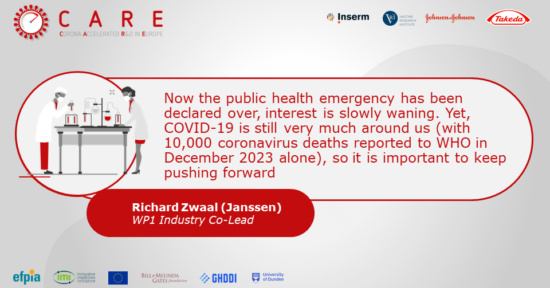January 25th 2024
The faces behind the CARE work-packages – Richard Zwaal, WP1 EFPIA Lead
The faces behind the CARE work-packages – Richard Zwaal, WP1 EFPIA Lead
CARE (Corona Accelerated R&D in Europe) is the largest European research initiative addressing the challenges of COVID-19. It is no surprise that it is designed in a comprehensive, yet agile, structure to fulfill the 38 partners’ shared key goals: (1) to identify therapeutics for the current pandemic, (2) to identify antiviral therapies for future outbreaks and (3) to increase the understanding of the pathophysiology of COVID-19. In a set-up of eight work-packages (WPs), the scientists and management at CARE carry out the project activities that have so far resulted in valuable learnings about the COVID-19 and how it might be defeated.
Over the course of the project, we have seen some changes in the leadership of the eight work packages, and will once again go behind the scenes through brief interviews with our newest work package leaders to hear insights on what makes their work so special, as well as their challenges and hopes.

WP1 – Anti-coronavirus drug discovery in phenotypic virus-cell-based assays
The CARE work-package 1 (WP1) dedicates its efforts to identify small molecule therapeutic candidates against the current SARS-CoV-2 and potentially other variants of concern using the infectious virus. For this, the CARE scientists take a close look at how the virus can be inhibited in cell culture using drugs that could potentially qualify for repurposing, small molecule libraries and biologicals. The EFPIA Lead of WP1, Richard Zwaal (Johnson & Johnson) shares his views on the work in WP1 of the CARE project.
Taking over the WP1 leadership, what accomplishments are you building on?
Over the course of the project, our top-notch scientists have done an amazing job working tirelessly to identify and develop new anti-coronaviral molecules. Excitingly, these are hitting new targets, expanding our armaments against the current and future strains of coronavirus. The excellent interaction between WP1 and the other work packages has also proven critical to progressing the different chemical series that we are advancing.
What will change with your new role as part of the WP1 leadership?
As we are moving into the final chapter of the CARE consortium, it will be important to prioritize our remaining efforts on advancing the internally developed chemical series as far as possible along the discovery pipeline..
What have you personally learned so far through the experience of working in CARE?
It is hard to believe that it has already been four years since the CARE project began. COVID-19 came out of nowhere and its rapid spread across the globe instigated a challenging and intense battle with many unexpected twists and turns. Unfortunately, we, and others, quickly found out that repurposing of existing drugs did not give us the golden bullet we needed, and we had to set out for de novo drug discovery programs. Now the public health emergency has been declared over, interest is slowly waning. Yet, COVID-19 is still very much around us (with 10,000 coronavirus deaths reported to WHO in December alone), so it is important to keep pushing forward, broadening our antiviral weaponry and preparing for patient populations that are still vulnerable for current SARS-CoV-2 infections.
What aspects will you be focusing on in your new role as co-lead of WP1?
The last year of a project always seems to fly by. We will be preparing for reaching the final milestones and deliverables, and will need to be thinking about extending our collaborations and partnerships beyond the current project.
With a new academic lead also in place for WP1, Johan Neyts, how will the two of you work together sharing the WP1 leadership?
Johan is a world-renowned authority in virology and I am really looking forward to working with him to achieve our project goals. I will do my best to ensure that we continue to build on the great work that has been done. I believe that with all the combined expertise in WP1, we can still make significant progress in this field.
.
